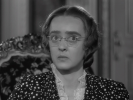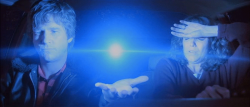Reviews
Irving Rapper
USA, 1942
Credits
Review by Briallen Hopper
Posted on 17 May 2012
Source Warner Bros. DVD
Related articles
Reviews
Now, Voyager by Matt
Categories Favorites: Transformations
I have loved Now, Voyager for so long now, and it is always such solace to be enveloped by it. I’ll never forget seeing it on the big screen six years ago in London. The red velvet curtains swept aside, the music swelled, the prow of an ocean liner cut through a frothy sea, and hundreds of women and gay men reached for their Kleenex in unison.
Thanks to the seductive string section stylings of Max Steiner and Peter Ilyich Tchaikovsky, Now, Voyager is a perfect melodrama. It’s also a dieter’s and drag queen’s dream—a film in which you can lose your eyebrows and some weight, don a pompadour and a corsage, and find yourself.
As befits a tale with a Walt Whitman title, self-transformation in Now, Voyager is fully embodied. Salvation requires sex, altered flesh, and literal voyages. And freedom in this film is defined through food and fat, and especially through women controlling their own fat and each other’s. Our heroine Charlotte Vale breaks free from her detestable mother, who “doesn’t believe in diets,” by dieting; she triumphantly quells her bullying niece by calling her “Roly-Poly”; and she proves her own suitability for motherhood by persuading her anorexic future foster-daughter to eat ice cream.
But despite its status as the quintessential melodrama and makeover/eating-disorder movie, Now, Voyager exceeds definitions. It is not so much the story of a single makeover as it is a series of metamorphoses, and it defies genres by allowing its heroine, in two short hours, to play nearly every mythic women’s role, whether tragic, comic, grotesque, or mundane. Bette Davis as Charlotte Vale embodies the classic heroines Galatea, Cordelia, Cinderella, and Camille; the clichés of the Impatient Virgin, the Woman in Love with her Analyst, and the Other Woman; the primal archetypes of Daughter, Sister, Aunt, and Mother (this is a highly matriarchal cinematic world); and the glowing advertising images of the Outdoorswoman, the Hostess with the Mostess, and the Most Popular Woman on Board. And she manages all this while at all times being (at least technically) that other cliché, the Old Maid.
Though it was no doubt made for unhappily married middle-aged housewives (as all Hollywood melodramas allegedly were), Now, Voyager is not about them, at least not in the way that Stella Dallas or Mildred Pierce or Magnificent Obsession or Imitation of Life or All That Heaven Allows are about them. Unlike these movies, Now, Voyager is not a fantasy fulfillment of a thirty- or forty-ish woman’s need for a second act after marriage and children have somehow failed to satisfy. Instead it is a fantasy about what can happen in one’s thirties when the first act never materializes.
What can happen, in brief, is that you can steam up some parked cars on a boat in a flashback a la Kate Winslet in Titanic; meet a charming shrink (Claude Rains) with whom you have great chemistry; check yourself into his delightful mental hospital; go on a diet; borrow some hot clothes; go on a vacay to Brazil and hook up with a sexy and inexplicably Austrian-accented married architect named Jerry (Paul Henreid); feel alive for the first time; nobly and passionately renounce Jerry because he can never get a divorce because he doesn’t want to lose custody of his children; feel unafraid for the first time; get engaged to a boring Bostonian WASP just because; get bored and break it off; inherit a million dollars from the mother you hated; check yourself back into the mental hospital for a minute and banter with Claude Rains some more; make friends with a young patient at the mental hospital who happens to be your architect ex’s adorable anorexic daughter Tina; unofficially adopt your architect ex’s adorable anorexic daughter Tina (it turns out she hates her bio-mom, and conveniently the feeling is mutual); and spend the rest of your life bouncing energetically around your mansion with your friends and your kid, parenting, partying, playing loud music, roasting hot dogs in the fireplaces, flirting with your former shrink, and using your money and know-how to help shape mental health care policy.
Very occasionally, say in the final minutes of your film, you may find yourself floating into a delicious moment of sky-high melodrama with your architect ex, who likes to light two cigarettes in his mouth at once and then soulfully pass one to you. By the transitive property, it will be like your lips are touching. It will be a thrill that you will relive and live off of for years.
Now, Voyager’s ultimate lines - “But are you happy, Charlotte?” “Oh Jerry, don’t let’s ask for the moon, we have the stars” - are just a fancier way of saying “Nobody’s perfect,” which is the gay man’s historic unanswerable answer to the straight happy ending. The 1990s version of this consolation-prize benediction, improbably voiced by Jack Nicholson, is “What if this is as good as it gets?” All these lines are strong statements about the irrelevance of a clichéd straight happiness, or straight sadness.
Jerry, oblivious straight man that he is, tries to tell Charlotte that she should want “some man who’ll make you happy,” but Charlotte, a self-described “sentimental fool,” ridicules this notion as “the most conventional, pretentious, pious speech I’ve ever heard in my life!” What Charlotte really wants is not the marriage plot but an end to the emotional exclusion she experienced as an odd and ugly spinster. She wants no longer “to be shut out, barred out, to be always an outsider or an extra!” She wants full participation in her passions.
Now, Voyager does not end happily ever after. But it does not end tragically either. It rewrites the Stella Dallas or Mildred Pierce story of self-sacrificing single motherhood and takes out the self-sacrifice. In the end, Stella and Mildred lose their daughters and their dream of romantic love. In a way, Charlotte keeps both. Her choice to devote herself to an adopted daughter rather than marrying a man she doesn’t love allows her to feel continuing currents of unsublimated romantic and sexual emotion; it even swells and floods them. For Charlotte, taking care of Tina is not a substitute for life with Jerry. Instead, single motherhood allows Charlotte to attain domestic and maternal bliss while remaining dazzled by desire for the unattainable man she believes she still loves, marriage and happy ending be damned.
Four years later, in It’s a Wonderful Life, Donna Reed would ask Jimmy Stewart for the moon, and get it, but for those four charmed intervening years spinsters could revel shameless in their starry moonless night.
More Favorites: Transformations
-

Altered States
1980 -

Alien: Resurrection
1997 -

In the Mouth of Madness
1994 -

Now, Voyager
1942 -

Honey, I Shrunk the Kids
1989 -

The Toxic Avenger
1984 -

Teen Wolf
1985 -

Teen Wolf Too
1987 -

An American Werewolf in London
1981 -

The Curse of the Cat People
1944 -

Face/Off
1997 -

That Obscure Object of Desire
1977 -

Now, Voyager
1942 -

From Beyond
1986 -

The Beast Within
1982 -

The Family Man
2000 -

Starman
1984
We don’t do comments anymore, but you may contact us here or find us on Twitter or Facebook.



